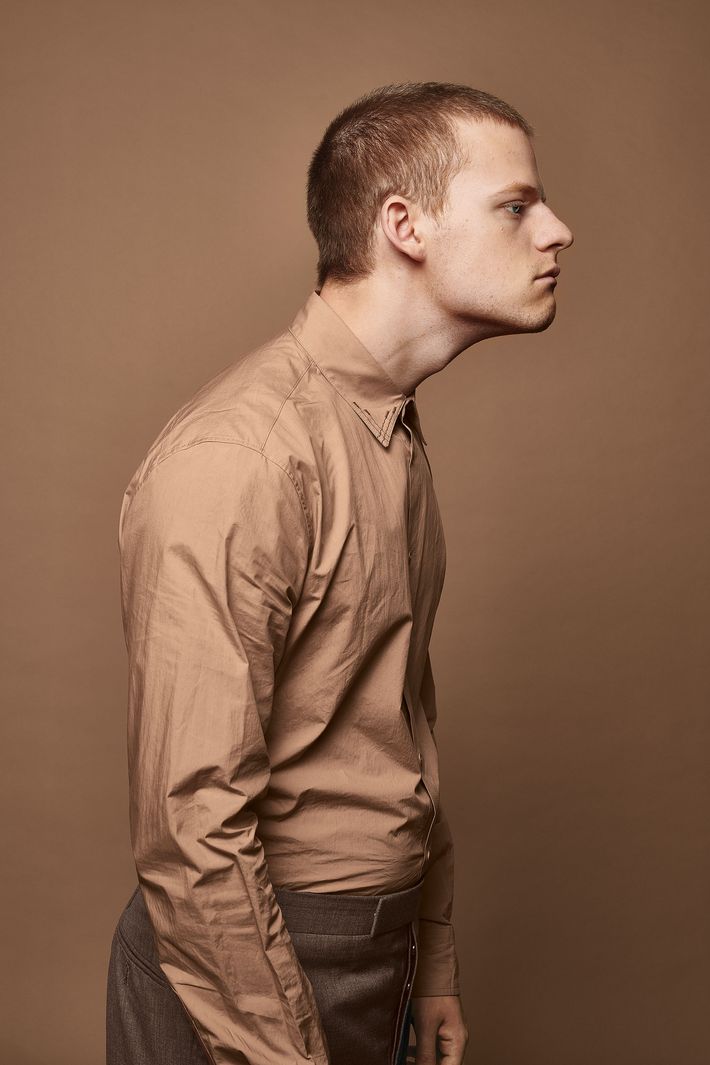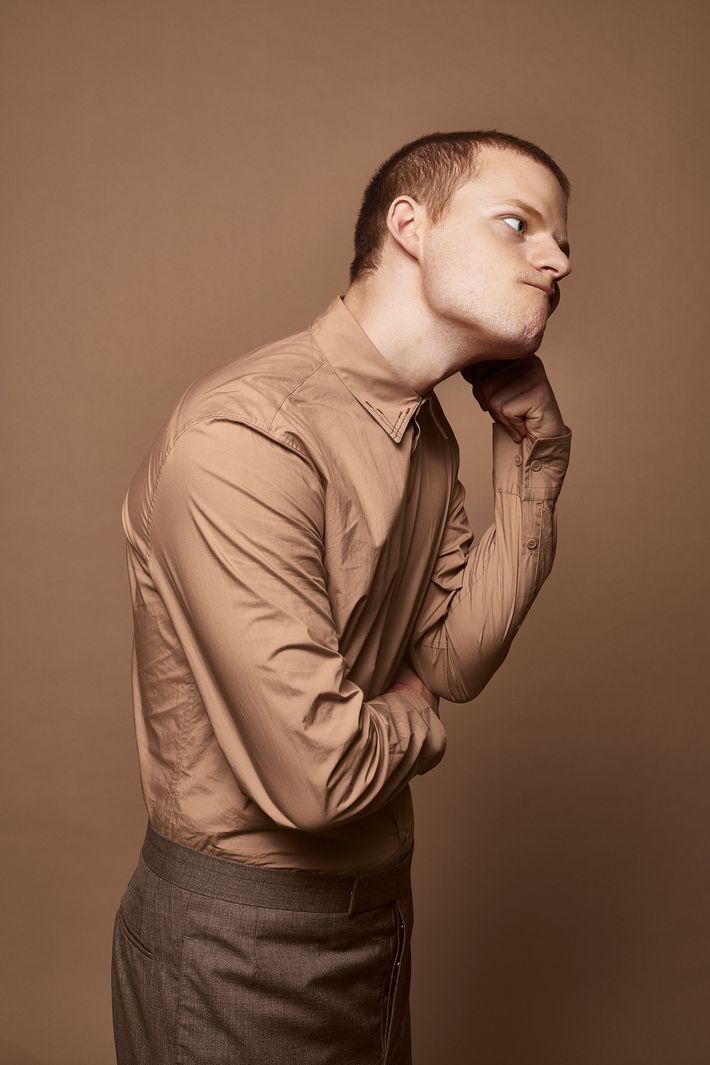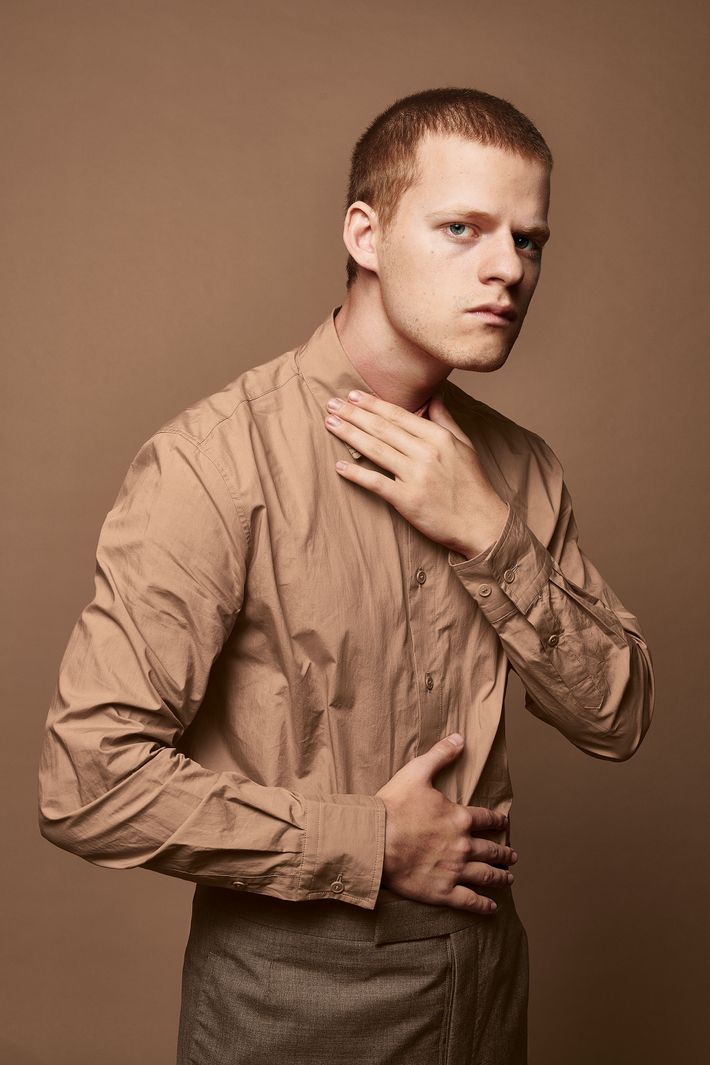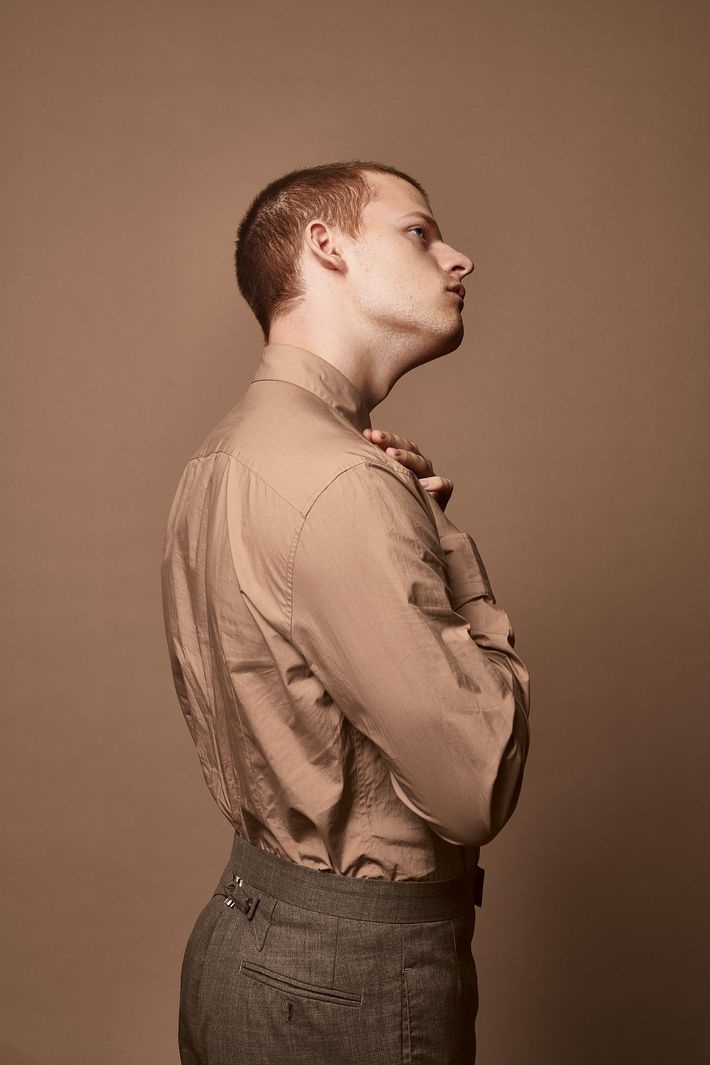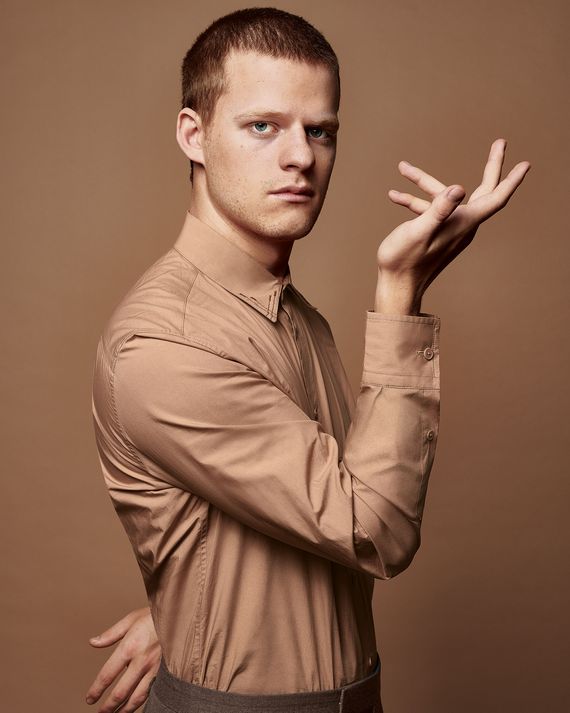
“Yesterday was my first tough day, and the first tough day on any project is like the end of the world,” says Lucas Hedges, sinking into his seat. The 21-year-old actor has met me for pizza after a rehearsal for The Waverly Gallery, a new Broadway staging of Kenneth Lonergan’s 1999 play that casts Hedges as a young man relating the tale of his Alzheimer’s-stricken grandmother, played by Elaine May. The first two days of rehearsal were good ones, Hedges tells me. The third, however, triggered a minor existential crisis.
“I just felt like, I’m letting everybody down, I’ll never know how to play this part, it’s gonna be six months of misery,” Hedges says, his sentences floating to earth in a native New Yorker’s weary, what-are-ya-gonna-do cadences. With The Waverly Gallery, he had resolved to commit the words to memory much later in the rehearsal process, so as not to get too married to his line readings. Now, though, Hedges fears everyone else in the cast must think he’s unprepared. “Like every great project,” he says, “it’s one of those things where I honestly don’t know if I’ll survive.”
Hedges doesn’t sound gloomy about his neuroses — he carries them around, matter-of-factly, like a backpack he’s been wearing for years. You’d hardly know from talking to him that his last three movies had all been nominated for Best Picture and that he has been nominated for an Oscar himself, or that every director in Hollywood seems to have Hedges on the top of their must-cast list. “He’s charming, funny, smart, emotional, and versatile,” says Lonergan, whose 2016 film Manchester by the Sea gave Hedges his breakout role as an orphaned smart-ass. “Who wouldn’t want to work with him?”
Last fall, that included Greta Gerwig, who picked Hedges to play Saoirse Ronan’s closeted boyfriend in Lady Bird, and Martin McDonagh, who cast him in Three Billboards Outside Ebbing, Missouri as Frances McDormand’s son, the only person in that town her character could not intimidate. This fall, as Hedges takes the stage in The Waverly Gallery, you’ll also see him onscreen as an abusive older brother in Jonah Hill’s Mid90s and playing his first lead roles in Joel Edgerton’s Boy Erased and Ben Is Back, directed by his father, Peter.
“There’s a real Everyman, or Every-young-man, quality to him,” says Edgerton, who calls what Hedges has a “beautiful regularness.” In person, Hedges is slight, with close-cropped hair, a sly gaze, and blond eyelashes that glint in the light, but his is a human-sized handsome, built for human-sized movies. “I think there are certain actors who resemble ‘people’ more than ‘actors,’ ” Hedges says. Growing up, he identified with character actors three or four times his age, like Alan Arkin and John Turturro — men who could play anybody and be anything. Maybe he’s more like them than his contemporaries, Timothée Chalamet and Tom Holland, young heartthrobs who can inspire breathless BuzzFeed articles simply by walking outside. Or maybe that will soon come for Hedges, too.
He is curious about that, just as he is curious about how he will come across in the profile I’m writing. At this stage, not many profiles have been written yet, and that has afforded him the freedom to try on new identities, both onscreen and off. “I feel like I’m a million different things,” he says. “It makes me feel, at least, that I belong in what I do for a living but it terrifies me because it makes me feel like I’m not a person.” This was true in school, where Hedges could flit between cliques with an ease that startled him, and it is true now, when each project calls for him to make himself over yet still, in some way, remain authentic. But it is not easy to remain a million different things in an industry and a world that would ultimately prefer you to just pick one.
Though he changes, Hedges tells me, based on whomever he is around, some of his qualities seem to be innate, like the self-doubt he can’t seem to shake. “At this point, I don’t even watch my movies just because of how problematic they make me feel,” says Hedges. “Mostly because I felt like every movie I did, I was the worst part of it.” Even his Oscar-nominated performance in Manchester by the Sea? “I genuinely thought I ruined the movie,” he says. “I remember thinking, The movie could have been good, but it isn’t because I’m in it.” But Hedges can’t stand talking about how he can’t stand watching himself, because he thinks it makes him sound like the sort of clichéd male thespian who revels in self-inflicted pain. “Some artists believe it’s a part of what they need to be in order to be good at what they do,” he says. “I think that’s actually bullshit, but it just so happens to be my experience.”
“He came in [for Manchester] half-nervous and half-confident,” recalls Lonergan. “The confident half disappeared in seconds. He worked very hard to get it back.” Edgerton corroborates: “He’s incredibly tough on himself. But I would rather meet someone who thinks they’re terrible and is actually wonderful than somebody who thinks that they’re wonderful and isn’t.”
Boy Erased, which Edgerton wrote and directed, stars Hedges as a gay teenager who is sent to conversion therapy by his religious parents, played by Russell Crowe and Nicole Kidman. It’s based on the memoir by Garrard Conley, and Hedges quickly keyed into Conley’s difficult journey toward self-acceptance. “I recognized that sense of anticipating and waiting for anyone and everyone to be like, ‘There’s something wrong with you,’ ” he says. “It’s a story about shame, which felt to me like the governing factor of my life and my childhood.”
It might sound unlikely for Hedges to state such a thing, or to be so self-doubting in the first place: After all, he was raised in a happy, artistic Brooklyn household by his father Peter, a filmmaker, and mother Susan, an actress and poet. Still, Hedges grew up convinced that there was something wrong with him. “I remember becoming obsessive,” he says. “I had this compulsion to confess all my thoughts to my mother, any bad thought I had.”
Once, in third grade, Hedges told her he had a crush on a boy at day camp. “I felt terrible about it,” he says. “I remember her being very comforting, and she understood that something was distressing me, and she said, ‘You don’t have to go back to camp today.’ ” He pauses. “I’m sorry, I can’t help but feel a little self-conscious, only because I’m talking to you and the world at the same time.”
Hedges knows that since he’s starring in Boy Erased, people will ask him about his own sexuality. “I owe it to this part to speak as honestly as possible,” he says. “In the early stages of my life, some of the people I was most infatuated with were my closest male friends. That was the case through high school, and I think I was always aware that while for the most part I was attracted to women, I existed on a spectrum.”
He remembers a sixth-grade health teacher describing sexuality as a broad range where many people may fall in some difficult-to-define space between straight and gay. “I felt ashamed that I wasn’t 100 percent, because it was clear that one side of sexuality presents issues, and the other doesn’t as much,” he says. “I recognize myself as existing on that spectrum: Not totally straight, but also not gay and not necessarily bisexual.”
Hedges envies people who can speak about such things with more certainty. “People expect you as an actor to have a voice that’s set in some way, and that’s really not what I am,” he says. “I’m very much within the conflict and confusion of my own life, still, and I definitely feel a pressure to step up in a way. I prefer to step up in my art, and I don’t entirely know how to in my life.”
Occasionally, art and life overlap. His father Peter, who directed Pieces of April and The Odd Life of Timothy Green, wrote Ben Is Back with Lucas in mind for the title role, a recovering heroin addict who surprises his mother (Julia Roberts) by dropping in on Christmas Eve. Hedges was initially reluctant to do the film, worrying that his casting would look like nepotism and knowing that every note his father gave him would feel as though he was being sent to his room.
Yet the script, once he read it, was too good to pass up. “The more I sat with it, the more it occurred to me that having him as my father might actually inform my artistic process in a positive way,” Hedges says. “He could either trigger me a lot, which would be useful, or he would inspire me. And addiction is a big thing in my family, so I thought maybe we could confront something as a family. I believe that when things are confronted with ceremony, they can be expelled.”
Was he able to lose himself in the role, given that his father was directing him? After all, when most of us are around our parents, we can’t help but revert to some earlier version of ourselves. “I don’t know that I did,” Hedges says finally, “but I don’t know that I could have, and I don’t know if it was wrong that I didn’t.” The movie helped him to know himself better. That, at the moment, is why he does what he does.
And if the ground should shift tomorrow, and he becomes someone else? He’s learning to be okay with that, too. Earlier this year, Hedges met a psychic who told him that his malleability is an asset, and lately he’s been inspired by The Mystic in the Theatre, a book about the legendary 19th-century actress Eleonora Duse, who was famous for her ability to blush at will in whatever part she was playing. “There’s this passage in the book that brought me a lot of comfort, where she says that she didn’t have to be one thing, that the truth about her is that she was a million different things and that was okay.” His smile is small but hopeful. “I think that’s kind of beautiful,” he says.
The Waverly Gallery opens at the John Golden Theatre on October 25.
*This article appears in the September 3, 2018, issue of New York Magazine. Subscribe Now!


